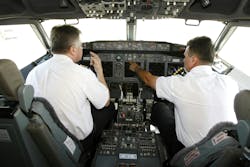FMI projects global aircraft flight control system market to more than double in the next decade
NEWARK, Del. - Future Market Insights in Newark, Del. reports that it projects the global aircraft flight control system market to grow from $17.5 billion in 2024 to $40.2 billion by 2034.
Flight controls are crucial components that manage the aircraft's orientation and flight while ensuring stability and maneuverability of the aircraft by controlling pitch, control, and yaw. These systems can be traditional and utilize mechanical linkages and control cables, or fly-by-wire, which uses electronic sensors that measure pilot input, and the data is transmitted to a computer, which then interprets and adjusts control surfaces through electronic signals.
FMI says that the global aircraft flight control system market value in 2019 was $10.4 billion. In the following five years, the demand for aircraft flight control systems increased at an annual growth rate of 11.2%. By 2023 end, the total value of the market was $15.8 billion.
Related: Skyryse debuts its single-stick, double touch screen operated helicopter
In 2024, the worth of the aircraft flight control system industry is estimated to be around $17.5 billion. Over the next ten years, the sales of aircraft flight control systems are projected to rise overall at an 8.7% rate. The total valuation of the market is forecast to reach up to US$ 40.2 billion by the end of this forecast period.
FMI cites the growing popularity of air travel in all countries as the key factor for the growth and development of aircraft or aerospace flight control systems. Improved safety protocols for the aviation sector in numerous countries are likely to drive the market further in the coming days.
"Modernization of military aviation with higher investment in China and the United States has played a crucial role in the advancement of flight control technology," says Nikhil Kaitwade, associate vice president at Future Market Insights, Inc. "Advancement in connectivity and data Integration solutions have also improved aircraft capabilities through flight control systems that easily interface with data networks and communication platforms."
FMI notes that the United States is likely to retain its dominance in the global market by following a compound annual growth rate (CAGR) of 9% through the projected years. The adoption of aircraft flight control systems in the United Kingdom is expected to increase at a rate of 10% per year until 2034, while China and Japan have CAGRs of 9.3% and 10.2% respectively. South Korea is expected to enjoy a growth rate of 11% over the next 10 years.
FMI writes that "the overall market is highly concentrated as manufacturers are providing more than half of the global demand for aircraft flight control systems. However, substantial government support and investment in developing economies trying to strengthen their military aviation sector is likely to diversify the market in the coming days."
To learn more about FMI's flight control market projections, please visit https://www.futuremarketinsights.com/reports/aircraft-flight-control-system-market.
About the Author
Jamie Whitney
Senior Editor
Jamie Whitney joined the staff of Military & Aerospace Electronics in 2018 and oversees editorial content and produces news and features for Military & Aerospace Electronics, attends industry events, produces Webcasts, and oversees print production of Military & Aerospace Electronics.
